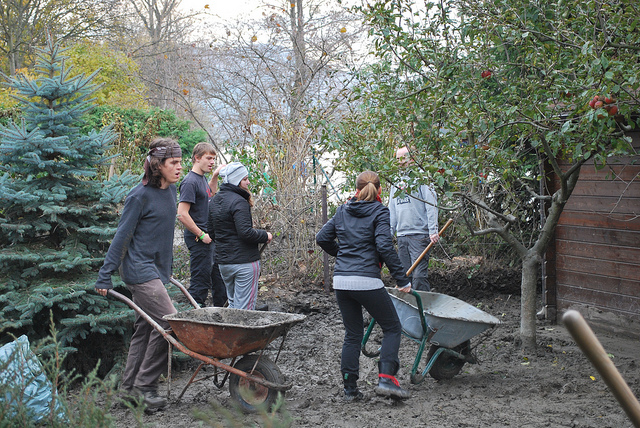You have /5 articles left.
Sign up for a free account or log in.
Natascha Chtena is a PhD student in Information Studies at the University of California, Los Angeles. You can follow her on Twitter @nataschachtena.

A while ago, guest-writer Kathryn Young wrote a great post here on GradHacker documenting the professional benefits of volunteering on campus. She wrote from the perspective of a master’s student preparing for the professional world and how her volunteering work beefed up her resume and made her stand out in the crowd.
But besides the benefits of offering free labor to your university and professors, I think there’s a lot to be gained and learned from helping out off campus as well. Paying it forward in your community can offer some much-needed balance to the emotional turmoil PhD work brings along and even help you cultivate happiness in grad school.
From planting corals or teaching kids how to use the Makey Makey, volunteering has been a wonderful experience that has re-energized me, taught me a bunch of things about myself, and given me a fresh perspective on my PhD. Here’s why:
1. You gain perspective. Despite all its hardships, all its draw-backs, all its disappointments, grad school is a world of privilege. We get paid to think and to use fancy words like “vernacularity,” “versimillitude,” “heteronormativity,” and “subalternity” in our daily interactions. We can make our comments as obscure or easy to understand as we wish. We can easily defend any side of an argument with no preparation and win. People outside academia are more likely to listen to us because we’re considered smarter and speak jargon. But we also freak out when we get anything less than an A, a stinging comment from a student, or a “crazy” request from our advisor. Minor things are easily blown out of proportion and start consuming our thoughts. A day teaching juvenile youth or feeding the homeless can readjust such thinking and remind us just how lucky we are.
2. You’re doing something tangible for your community that is also immediately rewarding. During a recent discussion about career goals, a professor told me that the difference between academia and industry is all about the types of questions one gets to ask: in industry you ask questions that take a few months to answer; in academia, you ask the types of questions that can take years. In a world where time is money, we’re incredibly blessed to be working on the time schedules that we are. But waiting for science and the humanities to eventually do good can be exhausting sometimes. When it comes to helping others, it’s refreshing to be able to think in terms of hours or days rather than decades; to be able to help people now, rather than someday in the distant future. Even if it’s in a soup kitchen instead of a lab.
3. You gain real-world experience that can significantly inform your academic work. Getting a PhD takes a long time—time you will most likely spend away from the professional world related to your area of research. Even if you’ve entered your program with substantial professional experience, the world you will re-enter after 4+ years will be a different one. Moreover, while reading and discussing theory is essential for intellectual growth, observing what works and doesn’t work in practice is just as important, especially for those of us committed to producing work that is socially relevant. Volunteering with kids at a local makerspace allowed me to experience technology-in-practice, in a way that isn’t possible through books and lectures.
4. You have the opportunity to pursue your passions outside grad school. No matter how much we love something or how dedicated we are to scholarship in a particular field of study, none of us is only one thing. We are a combination of many occupations and desires, and we all change over time. While my research is on digital media and learning, and while I can spend hours talking about how new technologies are reshaping education, anyone close to me knows that I am just as passionate about marine life and ocean conservation. From underwater beach cleanups to citizen science projects, my volunteer work allows me to actively engage with issues related to the environment as an active participant rather than just as another “interested observer,” which I find extremely rewarding.
I know that volunteering is not for everyone, all the time. I started looking into volunteering opportunities after I finished with my PhD coursework and had the time (at last) to reflect on who I’d become and what was missing in my life. I have the time to get away once in a while, but I know that students who are earlier in the program, or who have dependents, might have different priorities.
But if you feel like you’re losing touch with the real world or just feel the urge to give back, it’s definitely worth looking into. Don’t hesitate! There’s something for everyone out there: tutoring and mentorship programs, homes for the elderly, homeless shelters, street and beach cleaning efforts, and so on. Just be honest about who you are, what you want, and what you can offer!
Are you involved in any volunteering work inside and around your community? How has it changed your life?
[Photo courtesy of Flickr user Daniel Thornton and used under Creative Commons licensing.]








